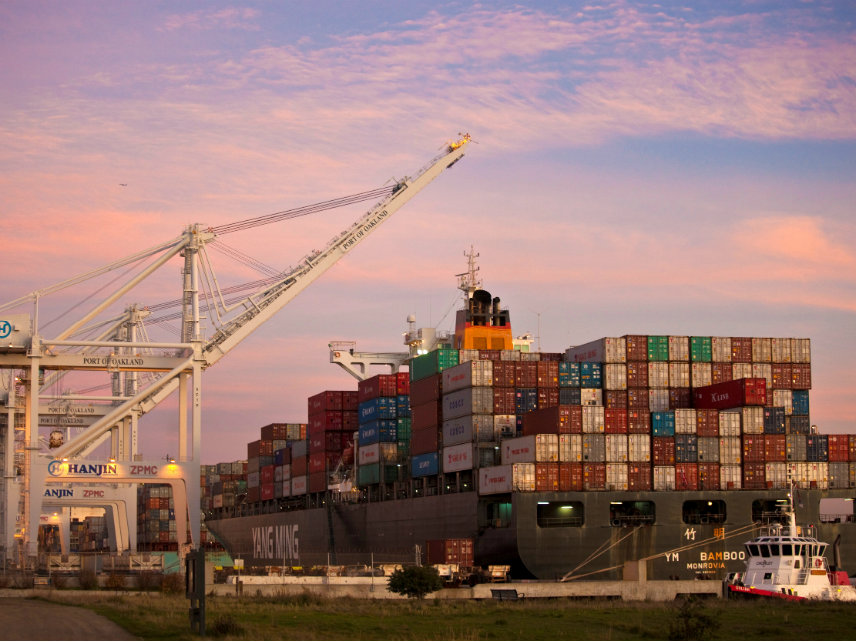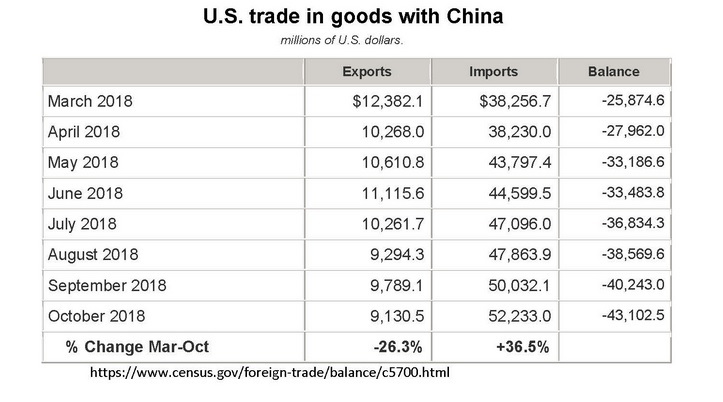America's Trade Deficit With China Just Hit a New Record
And it's not a record low. That's fine, but it's not what the president said would happen.

The Trump administration's protectionist trade policies were supposed to reduce America's trade deficit with China—or, at least, that's what President Donald Trump has repeatedly claimed—but new data shows that the gap between how much America imports from China and how much it exports to China hit a new record high at the end of 2018.
China's trade surplus with the U.S. was $323 billion in 2018, according to figures released this week by the Chinese government. That's a 17 percent increase from 2017. China said that its exports to the U.S. grew by 11.3 percent during 2018 (despite Trump's tariffs), while imports from the U.S. climbed by only 0.7 percent last year.
American data on trade was supposed to be released on January 8, but has been delayed due to the government shutdown. Alan Reynolds, a senior fellow at the libertarian Cato Institute, says the Chinese numbers may actually underestimate the growth of the trade deficit during 2018 (China's numbers sometimes exclude goods that end up in the U.S. after passing through other countries), since American data from March through October shows a larger jump in American imports.

Regardless of the final figures for 2018, it's pretty clear that America's trade deficit with China has jumped upwards in the two years since Trump has been president.
China's trade surplus with the US hit a record $324bn in 2018, according to new figures. Or about 28% higher than Obama's last year as president. pic.twitter.com/2bBSAQh2tT
— Simon Rabinovitch (@S_Rabinovitch) January 14, 2019
That probably has little to do with Trump or his trade policies, of course. The fact that American consumers and businesses are buying more things from China likely has more to do with the strength of the American economy over the past several years and increasing industrial capacity in China. As The Economist's Simon Rabinovitch, who tweeted the above chart, noted on Monday, the jump in the trade deficit could also reflect Chinese front-loading of exports in advance of Trump's tariffs. Either way, it should be clear that there are many other factors beyond Trump's control that dictate the size of America's trade deficit with China.
It's also something that's not really worth worrying about. As economists have been reminding us for months—including, by the way, Gary Cohn, Trump's former economic advisor, who left the White House after unsuccessfully trying to prevent Trump from imposing tariffs—trade deficits aren't a big deal. In the case of the U.S. and China, America's trade deficit is almost entirely canceled out by an investment surplus. In other words, America is a good place to invest money and China is a good place to build things. Free trade between the two countries helps both economies do what they do best.
In fact, running a trade deficit with China is probably good for the American economy. As Mark Perry, an economist at the American Enterprise Institute and editor of the think tank's Carpe Diem blog, has demonstrated, "increases in the U.S. trade deficit are associated with rising, not falling, employment levels in the U.S." A booming economy and high levels of personal consumption are a recipe for a trade deficit, writes Daniel Drezner, a professor of international politics at Tufts University. Those are things that most presidents would be thrilled about.
It's also worth keeping in mind that the trade deficit isn't something that the leaders of two countries can really negotiate. Sure, governments can impose policies that favor or disfavor trade, but the existence of a trade surplus or deficit is the result of millions of individual decisions made by businesses and consumers in the United States and China.
None of those exchanges are forced. American consumers and businesses voluntarily trade their dollars for imported goods. Cutting off that trade, Trump has argued, would "save us a hell of a lot of money," but that really misses the point. You'd save a hell of a lot of money if you didn't buy groceries every month, but you probably wouldn't be better off.
The economic data regarding the trade deficit shows that Americans have little reason to fear imported goods from China, and highlight once again how Trump's trade policies are failing to achieve their goals—while continuing to cause significant pain for American businesses in the process.


Show Comments (149)